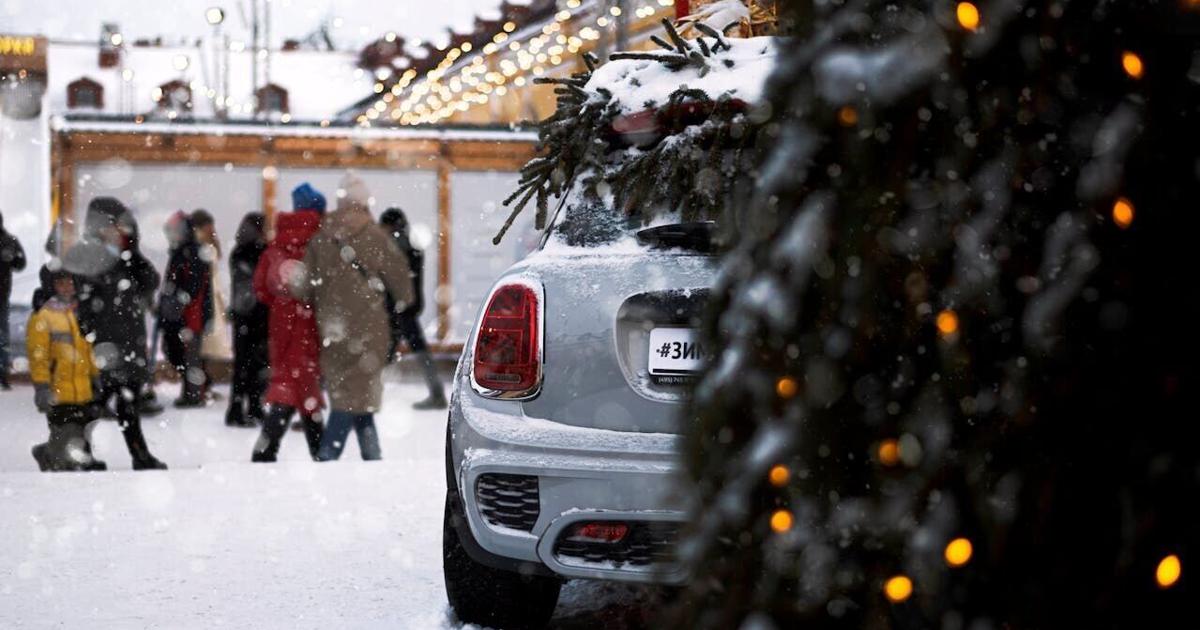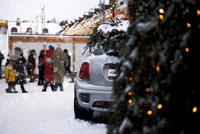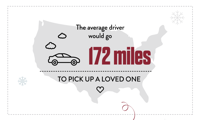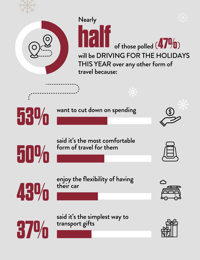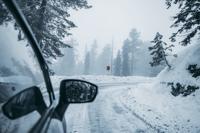(Photo by Vitali Adutskevich via Pexels)
Over half of Americans (57%) love the sense of adventure that a road trip offers, which is good news as drivers are set to spend 13 hours behind the wheel this holiday season, according to new research.
The survey of 2,000 American drivers found that while the average respondent will rack up nearly two working days of festive drive time between November and January, one in 10 (11%) will spend over 30 hours in their car during that timeframe.
Commissioned by Jiffy Lube and conducted by Talker Research, the survey investigated how Americans are planning to travel to loved ones this holiday season.
It’s a banner year for holiday road trips — almost half of those polled (47%) will be driving for the holidays this year over any other form of travel. But with that travel can come unexpected obstacles: Nearly one in three drivers have had their holiday derailed by car troubles, leaving them stranded, needing help from a tow truck, or arriving late to celebrations.
And while the majority love the thrill of a good road trip, 29% express being relieved when it’s over, and 17% say they’re exhausted after the drive.
Despite these challenges, most Americans say driving is worth it: Hitting the road remains the most affordable way to travel. Over half of those polled (53%) said that they’ll be driving this year to cut down on spending, with 50% saying it’s also the most comfortable form of travel for them.
Forty-three percent enjoy the flexibility of having their car, while 37% said it’s just the simplest way to transport gifts.
Americans are committed when it comes to spending time with family during the holidays: The survey asked how far people have ever driven just to see someone for the festive season, with the average respondent racking up 408 miles.
(Photo by RDNE Stock project via Pexels)
They’re equally dedicated to bringing loved ones to the celebration, with the average respondent driving 172 miles out of their way to pick up a loved one, and a heroic one in 20 (5%) saying they’d drive 700 miles or more.
At the end of the day, the drive leads to heartwarming experiences: 71% of respondents say that spending time with family and friends brings them the most joy during the holidays.
“Making memories with friends and family is easily one of the best parts of the holiday season,” said Suzanne Clerkin, Chief Marketing Officer of Jiffy Lube International, Inc. “It’s exciting to see so many Americans planning to drive to spend time with loved ones, creating joyous holiday memories.”
Before leaving for a road trip, 57% of respondents will pack the car the night before leaving and were well in agreement on what time you should get your holiday road trip started – seven in 10 say first thing in the morning is the correct time slot to hit the road.
(Talker Research)
The survey also dove into how people make their holiday road trips a bit more enjoyable and found that 62% get their car serviced ahead of time in order to obtain some peace of mind.
But despite seeing the value in keeping their car in tip-top shape, 72% of respondents admit they’ve gone over the recommended mileage for an oil change.
“During the busy holiday season, it’s tempting to put off car maintenance until a more convenient time,” said Suzanne Clerkin of Jiffy Lube. “It is important to ensure your vehicle is road-ready and that you are prepared for road trips and inclement holiday weather. After all, we want everyone to arrive at their destination safely and as planned to celebrate with loved ones.”
Syed Qaarif Andrabi
Survey methodology:
Talker Research surveyed 2,000 U.S. adults who drive a car; the survey was commissioned by Jiffy Lube and administered and conducted online by Talker Research between Oct. 6 and Oct. 13, 2025.
We are sourcing from a non-probability frame and the two main sources we use are:
- Traditional online access panels — where respondents opt-in to take part in online market research for an incentive
- Programmatic — where respondents are online and are given the option to take part in a survey to receive a virtual incentive usually related to the online activity they are engaging in
Those who did not fit the specified sample were terminated from the survey. As the survey is fielded, dynamic online sampling is used, adjusting targeting to achieve the quotas specified as part of the sampling plan.
Regardless of which sources a respondent came from, they were directed to an Online Survey, where the survey was conducted in English; a link to the questionnaire can be shared upon request. Respondents were awarded points for completing the survey. These points have a small cash-equivalent monetary value.
Cells are only reported on for analysis if they have a minimum of 80 respondents, and statistical significance is calculated at the 95% level. Data is not weighted, but quotas and other parameters are put in place to reach the desired sample.
Interviews are excluded from the final analysis if they failed quality-checking measures. This includes:
- Speeders: Respondents who complete the survey in a time that is quicker than one-third of the median length of interview are disqualified as speeders
- Open ends: All verbatim responses (full open-ended questions as well as other please specify options) are checked for inappropriate or irrelevant text
- Bots: Captcha is enabled on surveys, which allows the research team to identify and disqualify bots
- Duplicates: Survey software has “deduping” based on digital fingerprinting, which ensures nobody is allowed to take the survey more than once
It is worth noting that this survey was only available to individuals with internet access, and the results may not be generalizable to those without internet access.

